|
|
|
Sort Order |
|
|
|
Items / Page
|
|
|
|
|
|
|
| Srl | Item |
| 1 |
ID:
158219
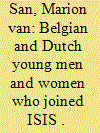

|
|
|
|
|
| Summary/Abstract |
Since the end of 2012 a sizeable number of Belgian and Dutch young men and women have joined the armed conflict in Syria. According to recent estimates, there are 632 Belgian and 260 Dutch foreign fighters in Syria. Very little is known about the families these men and women come from. The research on which this article is based comprised ethnographic research among 26 families with at least one member who has left for Syria to join the armed struggle. In addition, former teachers of these youngsters were asked to reflect on their students' actions. The central question of this article is whether or not the families of youngsters who left for Syria played a supporting role in the departure decision and, therefore, the process of radicalization of the young men and women. To answer this question the families' perception of the armed struggle is described. Also discussed are signals of radicalization present prior to the youngsters' departure and actions taken by the families to prevent departure or alternatively facilitate their trip.
|
|
|
|
|
|
|
|
|
|
|
|
|
|
|
|
| 2 |
ID:
092810
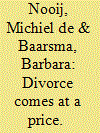

|
|
|
|
|
| Publication |
2009.
|
| Summary/Abstract |
Vertical unbundling in the electricity sector is a hot political topic in the European Union. The European Commission has decided that the ownership unbundling of transmission networks from other stages in the value chain is the most effective way to ensure fair network access and infrastructure investment. While this European unbundling debate has not ended yet and most countries still do not have an independent transmission system operator (TSO), the Dutch government has already taken one step further. In 2008, it decided that distribution companies should be completely separated from commercial activities that are part of the same holding (generation, trade and supply). This governmental decision has been fiercely debated. Although the goal is to improve competition as well as security of supply, these benefits are uncertain. Nevertheless, it is certain that ownership unbundling comes at a cost. In this paper we present an ex ante cost-benefit analysis of the Dutch unbundling act. We conclude that it is unlikely that this act is welfare enhancing: divorce comes at a price.
|
|
|
|
|
|
|
|
|
|
|
|
|
|
|
|
| 3 |
ID:
100557
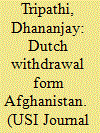

|
|
|
| 4 |
ID:
095356
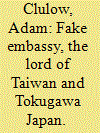

|
|
|
|
|
| Publication |
2010.
|
| Summary/Abstract |
In 1624, the Dutch East India Company established a colony on Taiwan. When Dutch authorities moved to tax and restrict Japanese traders, who had been sailing to the island for a number of years, they encountered immediate resistance spearheaded by Suetsugu Heiz?, a Nagasaki official and merchant heavily invested in the Taiwan route. As part of his struggle against the Dutch, Heiz? attempted to drag the Japanese state into the conflict by engineering a fake embassy formed of 16 aboriginal men recruited from a village in Taiwan and transported to the center of Tokugawa power in Edo. This paper explores the embassy and uses it to consider why powerful Asian states like Tokugawa Japan displayed so little interest in overseas expansion, creating a vacuum of power that European overseas enterprises rushed enthusiastically to fill.
|
|
|
|
|
|
|
|
|
|
|
|
|
|
|
|
| 5 |
ID:
102793
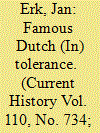

|
|
|
|
|
| Publication |
2011.
|
| Summary/Abstract |
Variations of Geert Wilders's xenophobic message are shared by the majority of the political parties represented in the
|
|
|
|
|
|
|
|
|
|
|
|
|
|
|
|
| 6 |
ID:
173313
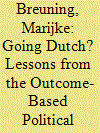

|
|
|
|
|
| Summary/Abstract |
Dutch political science curricula integrate the acquisition of knowledge of the discipline and transferable skills. This makes it an interesting case for US political science education, especially in light of Wahlke’s (1991) recommendations for a structured political science curriculum that incorporates skills training in addition to knowledge of the field. Although some of Wahlke’s recommendations were widely adopted, US political science curricula remain relatively loosely structured and often do not explicitly focus on transferable skills.
This article argues that the Dutch example may help US programs revisit how to best achieve learning outcomes that allow students to acquire both knowledge and transferable skills. This is not an argument for “going Dutch” wholesale; instead, the article suggests modest modifications to US political science curricula.
|
|
|
|
|
|
|
|
|
|
|
|
|
|
|
|
| 7 |
ID:
096641
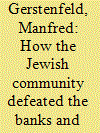

|
|
|
|
|
| Publication |
2010.
|
| Summary/Abstract |
In the mid-1990s there was a sudden renewed public interest in the issue of looted Jewish possessions during the war and their very partial restitution afterward. In the Netherlands, public interest in restitution issues gradually reemerged after several decades of almost total silence. In the late 1990s, public inquiries focused on the government, banks, insurers, and the Amsterdam Stock Exchange. At the turn of the twentieth century, the Amsterdam Stock Exchange was controlled by the major Dutch banks. The restitution negotiations between the Jewish umbrella-body CJO and the exchange therefore became part of those with the Dutch Banking Association (NVB). After exceedingly low financial proposals by the exchange, the representatives of Dutch Jewry in the Netherlands and Israel involved the World Jewish Congress (WJC) in the negotiations. The WJC in turn approached the Hevesi Committee of American comptrollers. Seeing the American business of their members threatened, the NVB agreed to increase the offered payment more than thirtyfold.
|
|
|
|
|
|
|
|
|
|
|
|
|
|
|
|
| 8 |
ID:
096147
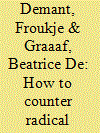

|
|
|
|
|
| Publication |
2010.
|
| Summary/Abstract |
This article deals with the role of government in encouraging the decline of radical movements. The question posed is: "Which story can the government tell to encourage the decline of radical groups and the disengagement of their members?" The article makes use of the survey of factors promoting decline and disengagement drawn up by Demant, Slootman, Buijs (†) and Tillie in 2008, as well as the factor "official policy strategies" based on concepts taken from discourse analysis, adapted to counterterrorism and deradicalization strategies by De Graaf in 2009. The article will therefore not address the different practical measures in this field, but focus instead on the perception of these official measures by the radicals. It will illustrate this with two case studies: the deradicalization of South Moluccan youths in the 1970s and of jihadist radicals after 2001, both in the Netherlands.
|
|
|
|
|
|
|
|
|
|
|
|
|
|
|
|
| 9 |
ID:
123179


|
|
|
|
|
| Publication |
2013.
|
| Summary/Abstract |
The 9/11 attacks and the subsequent increase of counterterrorism laws and regulations in Western democracies have also spurned heavy debates on torture and ill-treatment of captured terrorist suspects. However, while the Netherlands did deploy troops to Afghanistan and adopted new laws and policies regarding counterterrorism, debates on torture remained marginal. Indeed, the Netherlands has not suffered the pressure of a constant high terrorist threat, or endured a catastrophic terrorist attack. However, the author argues that there are more reasons for the lack of heated discussions. While this article does not intend to lift the Dutch case to an exemplary one, it illustrates how Dutch government authorities made good use of the benefits of hindsight regarding torture debates and incidents elsewhere and were able to apply lessons regarding accountability and oversight concerning interrogation issues at home successfully.
|
|
|
|
|
|
|
|
|
|
|
|
|
|
|
|
| 10 |
ID:
124276


|
|
|
|
|
| Publication |
2013.
|
| Summary/Abstract |
Historians may have come late to the study of women and gender in Southeast Asia, but when these three books are placed along a historiographical spectrum one can only be impressed at how far the field has moved in approach and methodology. Exploiting previously untapped sources that emanate from very different sites - a Dutch East India Company courtroom, the women's quarters of a Malay palace, the privacy of a Javanese home - the authors open up new avenues by which to explore the complexity of Southeast Asia's gender history. Though the contexts are very different, the movement through time (Wives, slaves and concubines is set in the late eighteenth century, Victorious wives in the nineteenth, and Realizing the dream in the twentieth) provides an opportunity to gauge shifts in representations of 'femaleness', attitudes towards gender roles, and women's responses to change.
|
|
|
|
|
|
|
|
|
|
|
|
|
|
|
|
| 11 |
ID:
127209
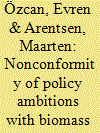

|
|
|
|
|
| Publication |
2014.
|
| Summary/Abstract |
Numerous regional authorities within the European Union are committed to meet renewable energy targets in line with the EU-20-20-20 strategy. Energy from biomass occupies a pivotal position in the renewable energy strategy of many regions. Effective bioenergy policy often depends on an assessment of the regional resource potential for energy from biomass. Using the Dutch province of Overijssel as a case study, this study presents a biomass resource potential assessment, based on existing statistics and a resource-focused methodology, to determine the region's theoretical and technical potential. Additionally, a methodological framework is provided to translate the outcome of this biomass resource potential assessment into the policy domain, to allow the region's bioenergy policy ambition to be evaluated. The results indicate that Overijssel's potential bioenergy target is a share of 8.3%, which does not match with the desired policy target of 14%. It is therefore clear that it is unlikely that the province's bioenergy ambition will be met with the current supply of biomass, in the absence of additional policy measures. The outcome of the biomass resource potential assessment has therefore been used to deduce and recommend multiple policy measures.
|
|
|
|
|
|
|
|
|
|
|
|
|
|
|
|
| 12 |
ID:
109097
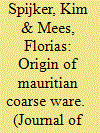

|
|
|
| 13 |
ID:
029789
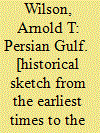

|
|
|
|
|
| Publication |
London, George Allen and Unwin Ltd., 1959.
|
| Description |
xi, 327p.Hbk
|
|
|
|
|
|
|
|
|
|
|
|
Copies: C:1/I:0,R:0,Q:0
Circulation
| Accession# | Call# | Current Location | Status | Policy | Location |
| 000233 | 909.096535/PER 000233 | Main | On Shelf | General | |
|
|
|
|
| 14 |
ID:
162975
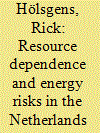

|
|
|
|
|
| Summary/Abstract |
Even though the Netherlands was well-endowed with domestic resources, but has also been dependent on foreign supplies. From 1850 onward, consumption of imported coal grew quickly. At the turn of the century, politicians became uneasy about this growing dependence. In 1901 the state-owned State Mines were established to exploit domestic coal and production gradually grew. In the interwar period the Netherlands became almost self-sufficient in coal. After WWII, it experienced a fast transition to oil dependence. In 1959 natural gas was discovered in Groningen by Shell and Esso, and the government forced them to join forces with the State Mines in the exploitation. The fast introduction of natural gas diminished the role of coal, but dependence on imported oil remained. The oil crisis triggered a reorientation of the energy policy, with emphasis on diversification in terms of resources and supplier countries. The export of natural gas was reconsidered. Shifts in energy resource consumption in the Netherlands in the past 150 years, were closely related to perceptions of risks. The Dutch government was strongly involved in previous energy transitions and will also have an important role to play in the transition to renewable energy.
|
|
|
|
|
|
|
|
|
|
|
|
|
|
|
|
| 15 |
ID:
139674
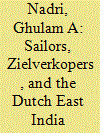

|
|
|
|
|
| Summary/Abstract |
In the second half of the eighteenth century, the Dutch East India Company (VOC) employed hundreds of Indian sailors in Surat in western India to man its ships plying the Asian waters. The Moorse zeevarenden (Muslim sailors) performed a variety of tasks on board ships and in the port of Batavia, and made it possible for the Company to carry out its commercial ventures across the Indian Ocean. The relationship between the two, however, was rather complex and even contentious. Based on Dutch sources, this article investigates the political-economic contexts of this relationship, examines the structure and organization of the maritime labour market in Surat, and illuminates the role and significance of zielverkopers (labour contractors) and of the local administration. The analysis of the social, economic, and familial aspects of the market and labour relations in Surat sheds light on pre-capitalist forms of labour recruitment and the institutional dynamics of the Indian labour market.
|
|
|
|
|
|
|
|
|
|
|
|
|
|
|
|
| 16 |
ID:
146803
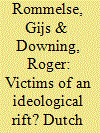

|
|
|
|
|
| Contents |
Dutch prisoners from the sea battles of the First Anglo-Dutch War of 1652–1654 were held in England under generally inhumane conditions. It has recently become accepted that ideological differences, as much as commercial, led to the deterioration in relations that led to the conflict. English public opinion had been inflamed by a vicious anti-Dutch propaganda campaign, suggesting that ideological demonization could provide the explanation for the dire treatment to which the prisoners were subjected. It is concluded, however, that logistical problems associated with their reception, plus the chronic lack of money of Cromwell’s regime, provide a sufficient explanation.
|
|
|
|
|
|
|
|
|
|
|
|
|
|
|
|
| 17 |
ID:
106878
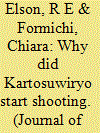

|
|
|
|
|
| Publication |
2011.
|
| Summary/Abstract |
S.M. Kartosuwiryo, famed leader of the long and bloody Darul Islam rebellion which began in West Java in 1948, was a strong supporter of the Indonesian independence struggle and a champion of the Indonesian Republic proclaimed in 1945. This article seeks to understand how it was that Kartosuwiryo came to oppose that very Republic with such violence in 1948-49. Many scholars have sought to explain the origins of the Darul Islam movement in terms of Kartosuwiryo's fanatic Islamist ambition. However, a detailed examination of the circumstances of the revolt's gestation and outbreak indicates that it was a consequence of a complex interplay of historically contingent circumstances rather than any ideological fixity.
|
|
|
|
|
|
|
|
|
|
|
|
|
|
|
|
|
|
|
|
|